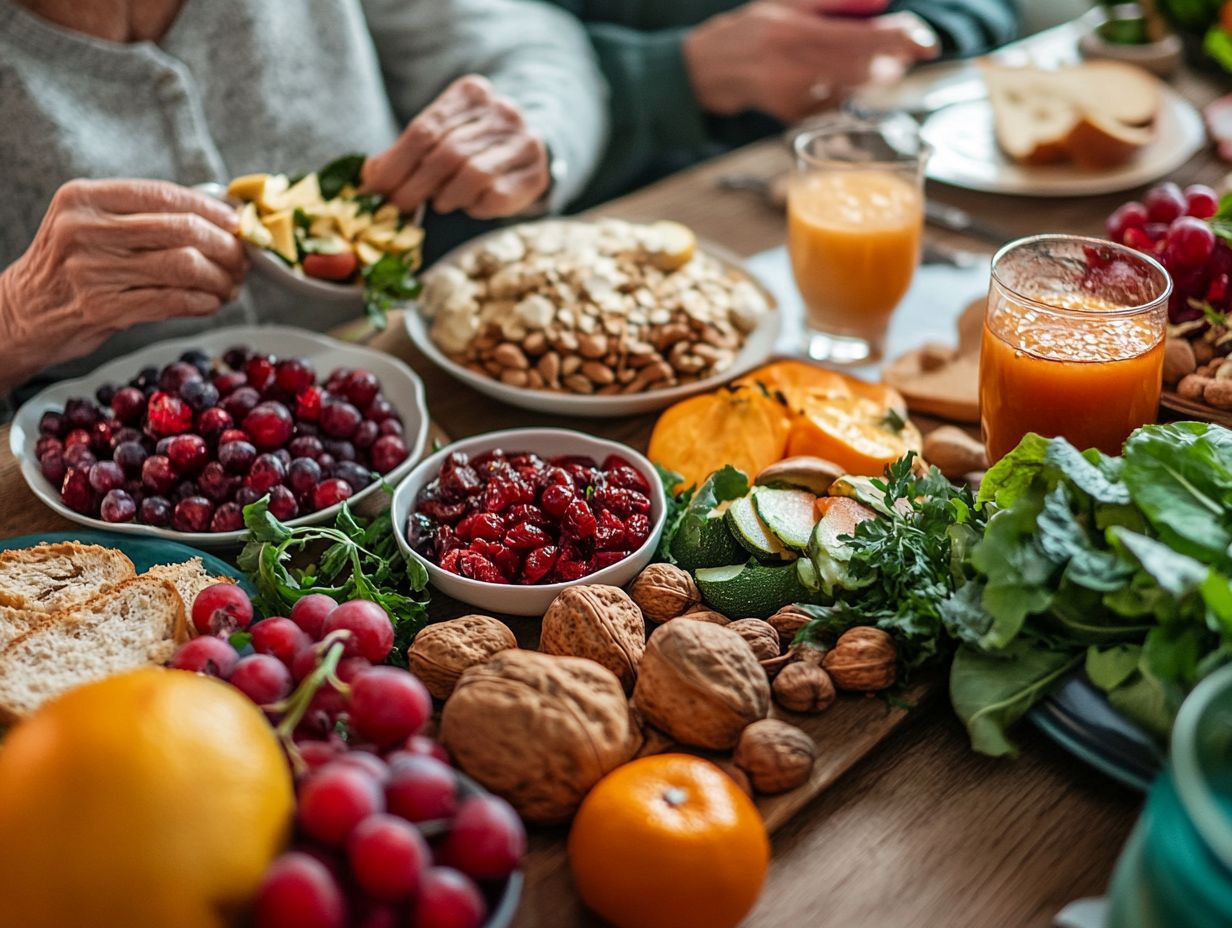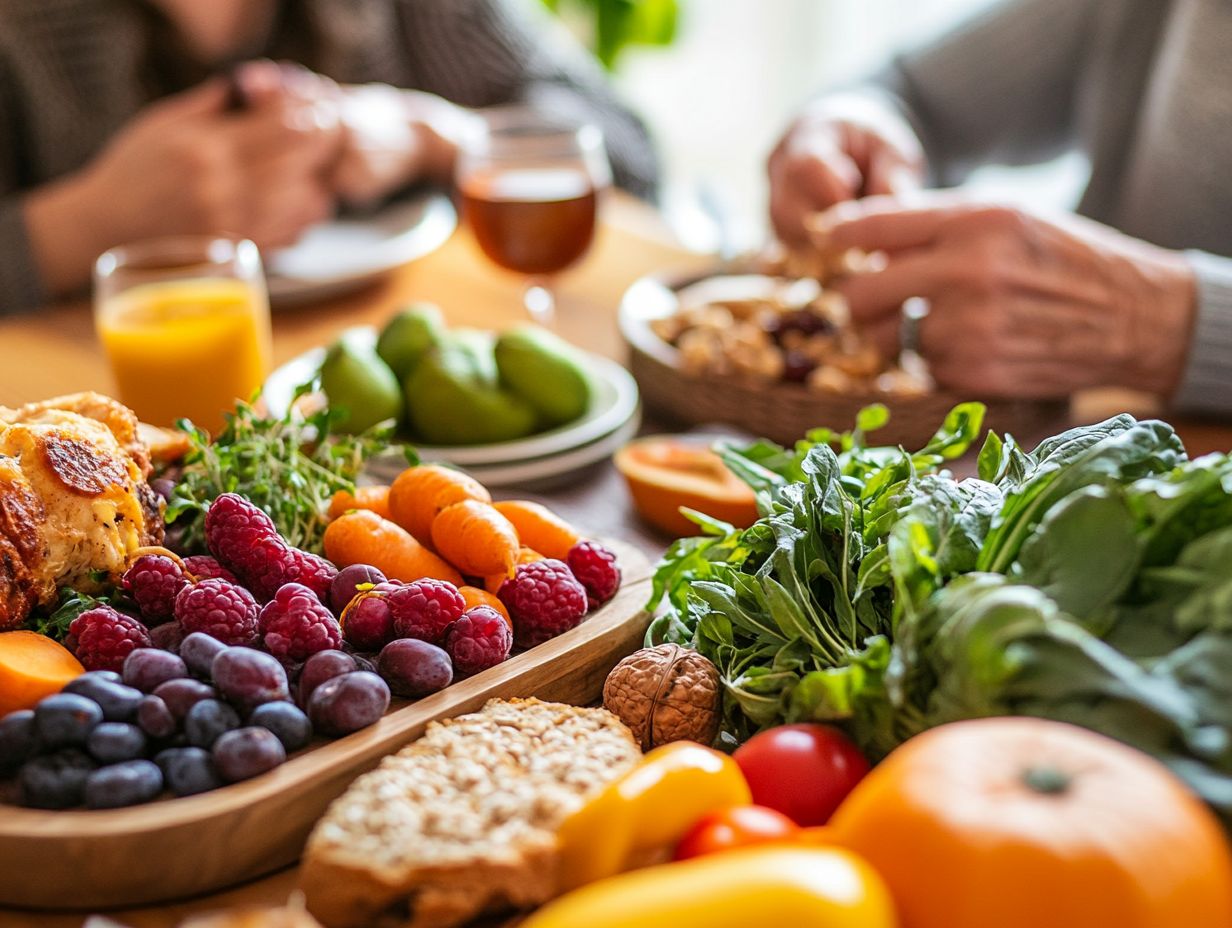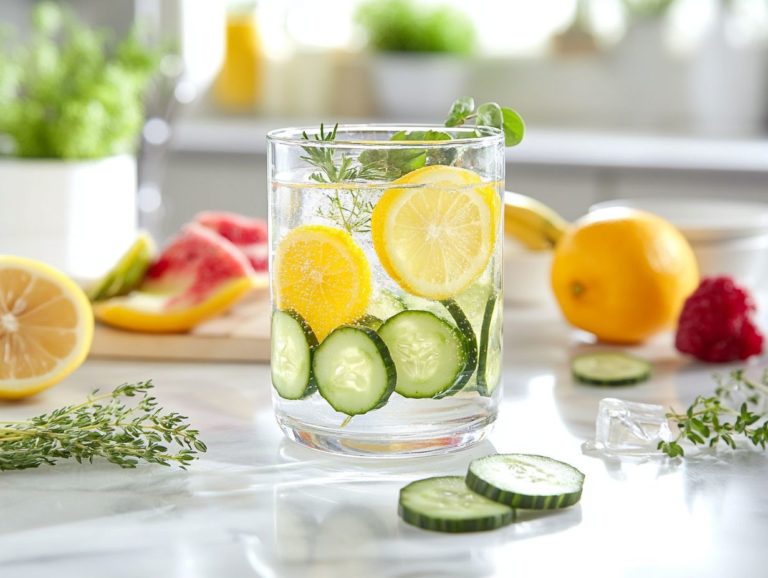The Connection Between Nutrition and Aging
As you age, your body experiences significant changes that influence your nutritional needs and overall health. Recognizing how aging affects these needs is vital for maintaining your vitality and well-being.
This article delves into essential nutrients that support healthy aging, the repercussions of inadequate nutrition, and practical strategies for achieving a balanced diet.
It emphasizes the crucial role of physical activity in maximizing nutritional benefits. By embracing these insights, you can take proactive steps toward a healthier, more vibrant life as you continue to age gracefully.
Contents
Key Takeaways:

Nutrition plays a crucial role in the aging process, with changing nutritional needs being a key factor. Understanding the connection between nutrition and energy levels can help you incorporate essential nutrients like vitamins and minerals into your diet, supporting healthy aging and preventing common health issues. Maintaining a balanced diet and staying physically active are essential strategies for promoting healthy aging.
The Aging Process and Nutrition
The aging process profoundly reshapes your nutritional needs. This underscores the importance of embracing a healthy lifestyle that emphasizes nutrient-rich dietary patterns.
Research from Tufts University reveals that as you age, your body demands a careful balance of large and small nutrients to lower the risk of chronic diseases like heart disease and type 2 diabetes.
Essential components like protein, fiber, and hydration are vital for preserving muscle mass and bone health. By focusing on these, you can ensure that your later years are not only active but also deeply fulfilling.
How Aging Impacts Nutritional Needs

As you age, your nutritional needs shift. Changes in metabolism, hormonal balance, and your body’s ability to absorb nutrients play a significant role. This highlights the importance of key elements like vitamin D and calcium in your diet.
Adjustments in your eating habits are essential for achieving optimal health. For instance, as muscle mass declines, protein intake becomes vital for maintaining muscle density and preventing frailty.
When your body absorbs fewer nutrients, deficiencies can occur, possibly leading to chronic diseases like osteoporosis or heart issues. Understanding these changes can empower you to take control of your health!
Key Nutrients for Healthy Aging
Essential nutrients like vitamin D, calcium, protein, and fiber are crucial for supporting healthy aging and warding off chronic diseases such as heart disease and osteoporosis.
By prioritizing these nutrients in your diet, you can enhance your well-being and longevity, ensuring you enjoy life to the fullest.
Vitamins, Minerals, and Other Essential Nutrients

Essential vitamins and minerals, like calcium and vitamin D, are crucial for maintaining your health as you age. They support hydration and protein intake to promote vitality.
These nutrients are vital not just for bone health; they also play a key role in muscle function, which tends to decline with age.
Magnesium, found in nuts and leafy greens, helps with energy production and supports nerve function.
B vitamins, particularly B12, are essential for cognitive health and can be sourced from fish and dairy products.
Hydration is equally significant. Staying well-hydrated facilitates nutrient absorption and supports overall bodily functions.
When combined, these nutrients work together synergistically to enhance your well-being, reduce fatigue, and mitigate the effects of aging, ultimately leading to a healthier, more active lifestyle.
Effects of Poor Nutrition on Aging
Poor nutrition can dramatically speed up the aging process. It increases your risk of chronic diseases like heart disease, diabetes, and osteoporosis.
This can take a toll on your muscle mass and overall vitality, leaving you feeling less than your best.
Prioritizing a balanced diet is essential for maintaining your health and youthful energy.
Common Health Issues Caused by Poor Nutrition

Poor nutrition in older adults can lead to serious health issues. This increases the risk of chronic diseases like heart disease, diabetes, and osteoporosis.
These conditions often result from not getting enough essential vitamins and minerals. Calcium and vitamin D are particularly important for bone health.
Research shows that nearly 30% of older adults experience malnutrition. This makes them more vulnerable to these serious health problems.
For instance, over 65% of seniors with poor diets struggle with heart disease. The rising rates of diabetes lead to alarming numbers of new diagnoses each year.
These worrying statistics highlight the urgent need for better dietary habits. Improving your nutrition is a vital step towards a healthier and more vibrant life.
Strategies for Maintaining Good Nutrition as You Age
To maintain good nutrition as you age, implement effective strategies. Adopt a balanced diet, follow the MyPlate guidelines for older adults, and focus on protein and hydration.
These practical tips can boost your overall health and vitality during this important life stage.
Tips for a Balanced and Nutritious Diet
A balanced, nutritious diet is essential for healthy aging. Incorporate nutrient-rich foods, stay hydrated, and focus on fiber and protein.
Make sure to include a variety of foods that provide essential vitamins and minerals. Think about adding leafy greens, colorful berries, and hearty legumes.
Meal planning can help with portion control. Aim to fill half your plate with fruits and vegetables, and the other half with whole grains and lean proteins like fish or chicken.
Hydration is crucial to avoid dehydration. Make it a habit to drink water throughout the day, and enjoy soups, smoothies, and herbal teas to increase your fluid intake.
With every bite and sip, you are nurturing your health and vitality.
The Role of Exercise in Healthy Aging
Exercise is critical for healthy aging. Regular physical activity helps maintain muscle mass and boosts overall well-being.
It also reduces your risk of chronic diseases, allowing you to enjoy a vibrant and fulfilling life as you grow older.
How Physical Activity Can Support Nutritional Needs
Getting active can supercharge your nutrition! Regular physical activity can greatly improve how your body absorbs important nutrients, helps maintain muscle mass, and supports a healthy lifestyle that includes staying properly hydrated.
When you stick to a regular exercise routine, you may notice that your body becomes better at taking in essential vitamins and minerals this is key for peak performance. This connection is especially visible in activities like strength training and aerobic exercises, which not only boost your heart health but also help your muscles absorb proteins and carbohydrates more effectively.
You can balance your diet with whole foods, lean proteins, healthy fats, and a colorful mix of fruits and vegetables to enhance these benefits even more. Don t forget about hydration; water is vital for how nutrients move in your body.
By improving both your physical activity and eating habits, you can significantly boost your energy levels and overall well-being.
Frequently Asked Questions
How does nutrition affect the aging process?
Good nutrition is essential in the aging process. Proper nutrition can help slow down aging and lower the risk of age-related diseases. Understanding the connection between nutrition and sleep is also crucial, as a poor diet can speed up aging and increase the risk of health issues as you age.
What are some key nutrients for healthy aging?
Key nutrients for healthy aging include protein, calcium, vitamin D, and omega-3 fatty acids. These nutrients help maintain muscle mass, bone health, and brain function, which are important for healthy aging.
How can a balanced diet help with age-related health issues?
A balanced diet can prevent or manage age-related health problems like heart disease, osteoporosis, and cognitive decline. This is because a balanced diet provides the necessary nutrients to support overall health and prevent chronic diseases.
Is there a specific diet recommended for healthy aging?
There isn’t a one-size-fits-all diet for healthy aging, but following a Mediterranean-style diet is linked to many health benefits. This diet focuses on whole grains, fruits, vegetables, nuts, fish, and healthy fats, while limiting processed foods and red meat.
How does a poor diet accelerate the aging process?
A poor diet can speed up aging in several ways. It may lead to chronic inflammation, which is associated with age-related diseases. It can also cause loss of muscle mass and bone density, increasing the risk of falls and fractures.
Can proper nutrition help with age-related skin changes?
Yes! Proper nutrition can assist with age-related skin changes. Nutrients like vitamin C, vitamin E, and antioxidants help protect the skin from damage and keep it looking youthful. Staying hydrated is also crucial for maintaining healthy skin as we age.
Start your journey to a balanced diet today!






